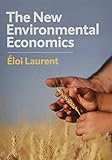The New environmental economics : sustainability and justice / Éloi Laurent.
Material type: TextLanguage: English Publication details: Cambridge, UK ; Medford, MA : Polity Press, 2020.Description: viii, 211 pages : illustrations ; 24 cmContent type:
TextLanguage: English Publication details: Cambridge, UK ; Medford, MA : Polity Press, 2020.Description: viii, 211 pages : illustrations ; 24 cmContent type: - text
- unmediated
- volume
- 9781509533817 (pbk.)
- HD75.6 L37 2020
| Item type | Current library | Collection | Call number | Materials specified | URL | Status | Notes | Date due | Barcode |
|---|---|---|---|---|---|---|---|---|---|
 Books
Books
|
Ladislao N. Diwa Memorial Library Reserve Section | Non-fiction | RUS HD75.6 L37 2020 (Browse shelf(Opens below)) | Link to resource | Room use only | 80468 | 00082838 |
Includes bibliographical references (pages 200-208) and index.
Part I Ideas and tools -- What the classics know about our world; what twentieth-century economics forgot -- Humans within the biosphere: The paradox of domination and dependence -- Governing the commons fairly -- Spheres of environmental justice -- Natural resources, externalities, and sustainability: A critical toolbox -- Part II Twenty-first-century social-ecological challenges -- Biodiversity and ecosystems under growing and unequal pressure -- Beyond EXPOWA (extraction, pollution, and waste) -- Energy, climate, and justice -- Well-being and our environment: From trade-offs to synergies --
Social-ecology: Connecting the inequality and ecological crises -- The social-ecological transition in context: Capitalism, democracy, globalization, and digitalization -- Urban sustainability and polycentric transition.
"Too often, economics disassociates humans from nature, the economy from the biosphere that contains it, and sustainability from fairness. When economists do engage with environmental issues, they typically reduce their analysis to a science of efficiency that leaves aside issues of distributional analysis and justice.
The aim of this lucid textbook is to provide a framework that prioritizes human well-being within the limits of the biosphere, and to rethink economic analysis and policy in the light of not just efficiency but equity. Leading economist Éloi Laurent systematically ties together sustainability and justice issues in covering a wide range of topics, from biodiversity and ecosystems, energy and climate change, environmental health and environmental justice, to new indicators of well-being and sustainability beyond GDP and growth, social-ecological transition, and sustainable urban systems.
This book equips readers with ideas and tools from various disciplines alongside economics, such as history, political science, and philosophy, and invites them to apply those insights in order to understand and eventually tackle pressing twenty-first-century challenges. It will be an invaluable resource for students of environmental economics and policy, and sustainable development."--Back cover
Fund 164 Linar International Book Resources, Inc. Purchased 06/06/2022 80468 pnr PHP 1,621.00 2022-05-333 2022-1-0319

